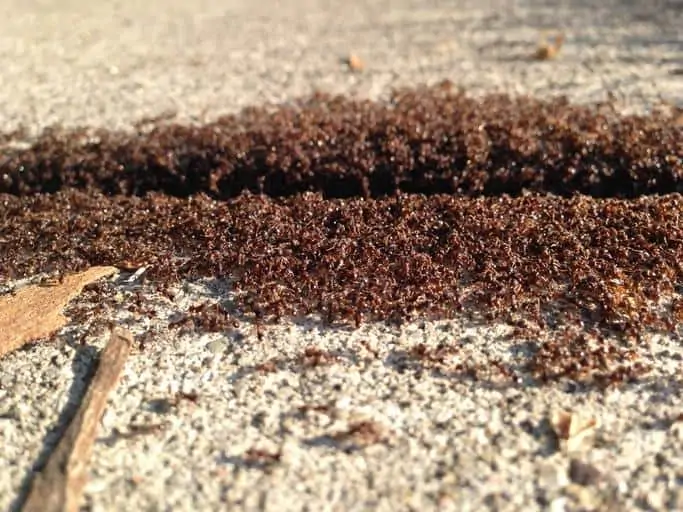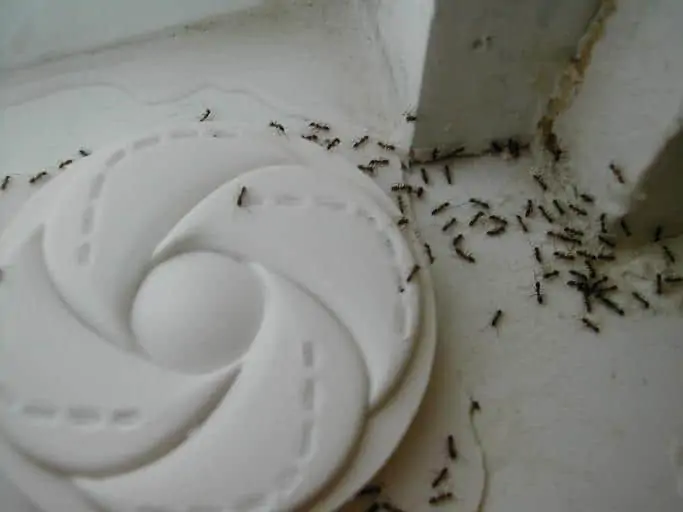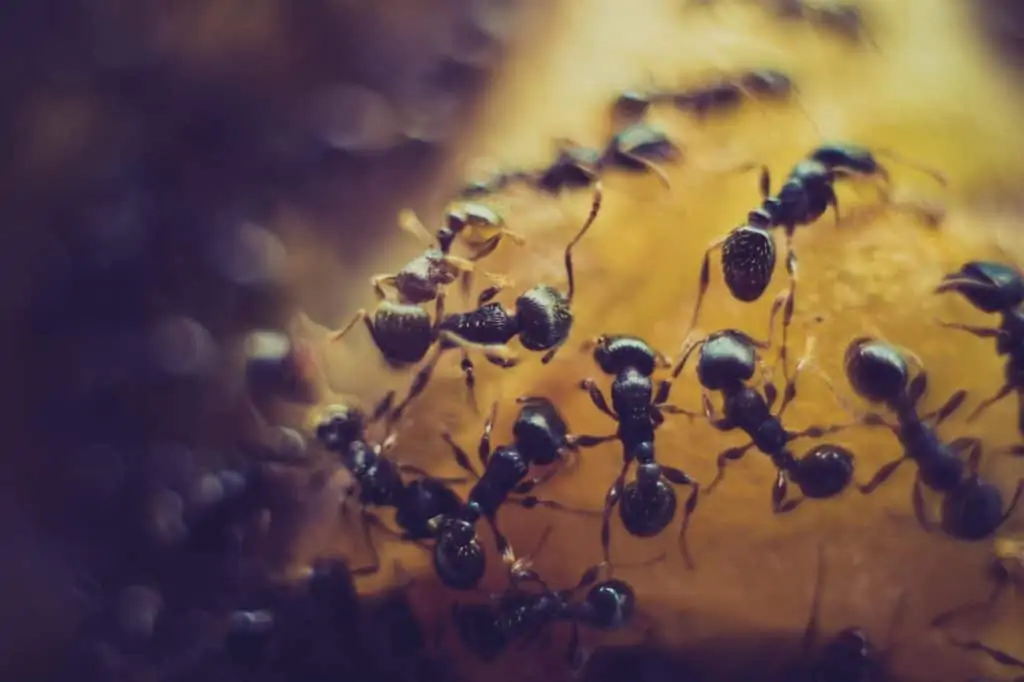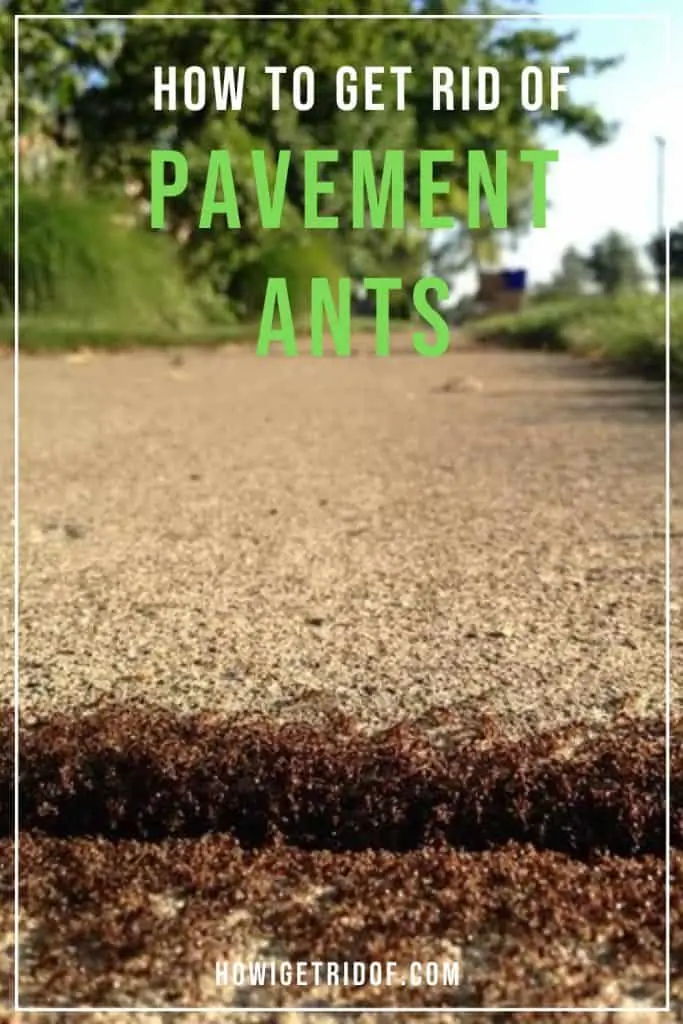Pavement ants are a serious nuisance all throughout the United States. You’ve likely come across pavement ants at some point in your life, and chances are if you’re here, you’re looking for how to get rid of them.
Unfortunately, these pests can be extremely difficult to control. They live in large colonies with multiple queens, are prolific reproducers, and can easily make their way into our homes in search of food.
The good news is that pavement ants are typically not dangerous to people or pets. Still, you likely won’t want them swarming inside your house.
So, without further ado, let’s talk about how to get rid of pavement ants.
Contents
What Are Pavement Ants?
Pavement ants live in large colonies and often build their nests below cracks and crevices in pavement.
Pavement ants are insects scientifically known as Tetramorium Caespitum. They are small, generally around 2.5 to 3 mm in length with segmented bodies, antiennaea, and six legs. They can range in color from light brown to black, and do have the ability to sting people.
However, most experts agree that pavement ants are generally docile and don’t typically pose a risk to humans other than being a nuisance.
With that being said, if pavement ants do get into your home in large numbers they can contaminate food and spread illnesses and bacteria like salmonella and e-coli.
For the most part, pavement ants prefer to live outdoors. They build large colonies deep below the surface of the earth with entry and exit points generally in the cracks and crevices of pavement, hence the name pavement ants.
Because pavement ants seek out pavement to build their nests and grow their colonies, it’s common for them to nest quite close to people. When this happens, they can get into homes through vulnerabilities in the siding or improperly sealed doors or windows.
Pavement ants have a very diverse diet, feeding on a variety of human foods like meat, grains, sweets, fruits and vegetables. They also feed on live and dead insects and are attracted to the smell of garbage or dirty dishes left out in the sink overnight.
When it comes to getting rid of pavement ants, treatment can be tricky. One of the reasons is because these ants are prolific reproducers. They build colonies in the tens of thousands and each colony has multiple queens. Queens are capable of laying hundreds of thousands of eggs a day, and queens often live far longer than five years.
Colonies are made of worker ants, queen ants and swarmers. Swarmers are winged male and female ants that are at mating maturity.
They typically mate during the summer, often in June and July, and then a newly impregnated female will go off to begin her new life as a queen of a new colony.
Another reason getting rid of pavement ants can be so difficult is because they tend to build nests deep below the soil, often underneath slabs of pavement.
They get into the cracks and crevices of the soil and build nests several meters below the surface. These nests are intricate, with complicated tunnels leading to and from the nest.
Furthermore, you could have multiple colonies of pavement ants nesting on your property, as they can find adequate homes on patios, porches, garage floors, and even concrete walls. If they get inside your home and the living conditions are ideal for them to stay, pavement ants can make nests behind the walls or beneath floor boards.
Luckily, most pavement ants are problematic outdoors. With that being said, worker ants can find their inside your home in search of food. If they find food inside your home, these ants will return in very large numbers, leaving you at risk for food contamination and even potentially dealing with a pavement ant infestation inside.
Common Signs Of Pavement Ants
Common signs of pavement ants include seeing the ants themselves, as well as dirt mounds near sidewalks and pavement.
Do you have pavement ants?
These pests are easy to identify due to their dark brown or black bodies, which have unique double-nodes between their thorax and bottom. However, the most telling signs of pavement ants near your home are seeing the pests themselves congregated near their nests.
Pavement ants move about in large numbers, often working erratically along cracks or imperfections in pavement. As they build their nests, they remove soil from below the concrete, and this soil often winds up in small mounds along the pavement.
Unfortunately, pavement ants are a common pest throughout the entire United States. In regions where the weather is warm, they can be a nuisance all year round. However, in colder states pavement ants tend to be most problematic during spring, summer and early fall.
Why Do I Have Pavement Ants On My Property Or In My Home?
Pavement ants can build nests beneath floorboards, in walls and beneath large stones and boulders.
Because pavement ants are so common throughout the country, it is likely that you’ll deal with them once the weather warms up along your pavement. Pavement makes an excellent and protective home for these ants, as they can build their nests below this weather-proof and predator proof material.
Still, it’s more than just cracked pavement that could be attracting pavement ants to your home. Pavement ants are highly attracted to warmth, moisture and food.
If they do get into your home, you’ll often find them in rooms that stay humid like kitchens, bathrooms, basements or attics. But what attracts these pests into your home in the first place?
It is most likely going to be the smell of food. Pavement ants have an incredible sense of smell, with an estimated four to five times the number of smell receptors than many other types of insects.
This means that even the smallest amount of food or crumbs can lure pavement ants into your home.
Some of the most common attractants for pavement ants include:
- Improperly stored garbage
- Pet food
- Bird seed
- Fruit and vegetables on counter tops
- Improperly stored pantry foods
- Dirty dishes left in the sink
- Fruits on fruit rees in the yard that are left to become too ripe
- Vegetables in the garden that are not harvested in time
Pavement ants also feed on other insects both dead and alive and are attracted to honeydew created by aphids. So, if you have a very large infestation of pavement ants in your garden, for example, you may have another pest issue to contend with as well.
Although it can be difficult to get rid of pavement ants, management and control is certainly possible.
You have a few different options to choose from when it comes to pavement ant control and removal, which we’ll discuss in more detail below. Keep reading.
Best Insecticides And Baits For Getting Rid Of Pavement Ants
Slow acting bait stations are some of the best products for how to get rid of pavement ants.
Pavement ants are some of the more complicated ants to control and get rid of, but there are several options and methods you have for removal.
These methods include using common pest control products that are made with chemical insecticides, natural insecticides, baited poisons and do it yourself methods.
In this section of the article, we are going to cover some of the top insecticides for how to get rid of pavement ants both inside and outside of the home. Take a look!
Amdro Ant Block Granules
No products found.
We are listing Amdro Ant Block granules because they not only work for pavement ants, but also 25 other ant species. This product is most effective because it not only kills worker ants but also queens and the entire colony.
Once applied, this product can continue to work for up to three months. This is specifically for outdoor use and works using baited granules that ants consume and take back to the nest.
The active ingredient in this bait is a chemical insecticide, however, so it’s important to use this product only as directed and keep it out of reach of children and pets.
Terro Outdoor Liquid Ant Bait
No products found.
According to a number of experts, one of the most effective ways to treat pavement ants is to use a slow acting ant bait that allows ants time to consume the poison and then bring it to the rest of the colony before it begins working.
The above bait stations by Terror are for outdoor use and work against pavement ants. The bait stations come prefilled and work using the active ingredient borax, which is deadly to ants when consumed.
We like that these stations come with flexible placements, so you can actually use stakes to place them into the earth and keep them where they need to be.
The stations are also designed to be weather resistant to ensure they do not leak and that ants can get in and out of the bait stations needed.
Terro Outdoor Ant Killer Spray
No products found.
For a more targeted pest control option, we recommend using Terro Outdoor Ant Control Spray. This spray is specifically for outdoor use and works against a number of species of ants including pavement ants and carpenter ants, as well as roaches, Asian lady beetles and boxelder bugs.
The product is long lasting once it is applied and works using the active chemical ingredient permethrin. Permethrin is a common ingredient in insecticides that is known to work against pavement ants and help treat them.
All Natural Products For How To Get Rid Of Pavement Ants
Pavement ants can be removed using natural methods like Diatomaceous Earth or ultrasonic sound repellers.
Although pavement ants are known to be complicated pests to control, they are also quite sensitive to certain natural ingredients like essential oils and ultrasonic vibrations. This is great news if you are passionate about organic pest control or if you are concerned about using chemical insecticides in your home with children and pets.
But what are the best natural products for how to get rid of pavement ants, and which products really work? We have listed some of our favorites for you to consider below.
Wondercide Outdoor Pest Control Spray
No products found.
Wondercide is an all natural insecticide that works using a combination of plant based ingredients including essential oils like peppermint oil, rosemary oil, cedarwood oil and sesame oil. This product works to kill and prevent pavement ants, ticks, fleas, roaches, crickets, scorpions, flies, mosquitoes and more.
This is a safe product to use around areas where children and pets play and you can even spray it directly on ornamental plants and vegetation. Wondercide comes in three different sizes depending on your needs and there is no spray and wait time.
This product will also not harm beneficial insects and is completely safe for the environment.
Neatmaster Ultrasonic Pest Repeller
No products found.
An ultrasonic pest repeller won’t necessarily keep pavement ants from building nests below your pavement outdoors, but it can protect garages and even your home from these pests. Ultrasonic pest repellers work by emitting ultrasonic sound waves and vibrations that pests find highly irritating.
These ultrasonic sound waves and vibration are harmless and often go unnoticed by people and pets, and can help ensure that pests like pavement ants, rodents, roaches, spiders, and other pests steer clear of your home.
Diatomaceous Earth Crawling Insect Killer
[amazon box=”B082LRSCV8″ style=”light” title=”Diatomaceous Earth Crawling Insect Killer” template=”widget”
Also known as DE, Diatomaceous Earth is an all natural product that comes in a powder form. It has many uses, but this specific product above by Harris is designed to kill pests like ants, roaches, and even bed bugs naturally and without the use of harsh chemicals.
Diatomaceous Earth is made from fossilized algae, and it works by penetrating the waxy exoskeleton of pests like pavement ants which ends up dehydrating and killing them.
While we do like Diatomaceous Earth for pavement ant control and removal, this product will likely not work on its own to kill the entire colony. It is best used in conjunction with other pest control methods and remedies.
Home Remedies For Control Of Pavement Ants
Baking soda mixed with powdered sugar can make a natural and effective ant bait and killer.
If you took it upon yourself to read the ingredients of the above natural insecticides for how to get rid of pavement ants, you may have noticed that some of them contain natural, plant based ingredients like essential oils or citrus.
Suffice it to say, it’s quite possible you already have some ingredients in your pantry or medicine cabinet you can use to get rid of and prevent pavement ants from coming around.
Let’s take a look at some of the best do it yourself pest control methods you can use for how to get rid of pavement ants below.
Baking Soda and Powdered Sugar Bait
One of the most effective ways to get rid of pavement ants is to use a lethal bait that the workers will bring back to the queen. Unfortunately, a number of lethal baits are not only dangerous for ants but also people and pets.
However, you can make a completely safe ant bait to place around pavement ant nests using baking soda and powdered sugar.
Baking soda naturally expands in moisture, which means if it is ingested by a pavement ant it will kill them. When combined with powdered sugar, you are creating a bait that is highly enticing yet deadly to ants.
To make this concoction, mix the powders and sprinkle it around ant mounds you find outside or in cracks and crevices of sidewalks.
We do not recommend using this method to prevent pavement ants from getting inside your house, however, as the powdered sugar could act as a lure and actually wind up bringing ants inside.
This natural method for how to get rid of pavement ants not only works for these pests but also other insects like roaches.
Vinegar and Water Spray
Ants are repelled by the smell of vinegar, and you can make your own vinegar and water spray using equal parts vinegar and water to not only repel ants but also clean your home.
For extra cleaning powder, consider adding about half a shot glass worth of rubbing alcohol or vodka to the mix. To enhance the smell, you may also have a few drops of peppermint oil.
You can use this spray to clean in cupboards and cabinets, and anywhere food is stored and prepared. This solution is safe enough to use in areas where children and pets play and eat, and can help not only repel pavement ants but wipe away any scent trails left behind by worker ants that could potentially bring more ants into your home.
Dish Soap And Boiling Water
For a more targeted natural method to get rid of pavement ants, you can try using boiling water and liquid dish soap.
However, this method is best when you know you have caught a pavement ant invasion early, as the water will likely not penetrate the earth deep enough to kill the entire colony.
To use boiling water and dish soap to kill pavement ants, bring a pot of water to a boil and add liquid dish soap. Mix until the water is sudsy, and then carefully take the pot outside and pour it into the entrance points of pavement ant nests.
Try Whole Cloves, Bay Leaves or Peppermint Leaves
Whole cloves, bay leaves or peppermint leaves can work as a natural deterrent to keep pavement ants from coming inside your home. They may also work early on to repel pavement ants and keep them from building nests in certain areas around your property.
Sprinkle Coffee Grounds Near Dirt Mounds
Pavement ants are also deterred by the strong smell of coffee. If you’re looking for a natural way to repel these pests without the use of chemicals, sprinkling coffee directly around your sidewalks could help deter these pests from building their nests.
However, coffee can be toxic to curious pets if ingested, so we do not recommend that you use this method if you have dogs or cats.
Make An Essential Oil Ant Repellent Spray
The best essential oils to repel pavement ants include oils like peppermint oil, citrus oils and tea tree oil. These oils will also work to repel a number of other pests including other species of ants, roaches, spiders, and more.
To make your own essential oil spray, you will need 10 to 20 drops of one of the above listed oils, two cups of water and a spray bottle.
Combine this solution together and spray it around your home and along sidewalks or anywhere you have noticed pavement ants to be present.
If you prefer not to make an essential oil spray, you do have the option of simply saturating cotton balls with one of the above listed oils and placing them around the entrance points of the pavement ant nests.
You can also place these cotton balls inside your home near windows, doors, and other possible entry points to help keep ants at bay.
And speaking of keeping pavement ants at bay, let’s now talk about how to prevent these pests from getting out of control in the future.
Keeping Pavement Ants From Returning – Expert Tips
Pavement ants are best managed through continuous pest control routines and monitoring.
Since getting rid of pavement ants can be so difficult, it’s typically best to be proactive rather than reactive when it comes to pest control methods to manage them.
There are several steps you can take to not only protect your home but also your property from dealing with pavement ants.
Here are some of the best pavement ant prevention tips, according to experts.
Refrain From Using More Than Two Inches Of Mulch Or Consider Using Cedar Mulch
Mulch collects moisture, which pavement ants love. It also provides ants with a safe place to hide and move about in search of food. Worse, mulch often attracts other insects like earwigs, roaches and pill bugs.
If you do need to use mulch in your yard or garden, it is recommended that you use less than two inches to help reduce the number of pests that might try and hide below the surface. If at all possible, you should also try and use cedar mulch.
Cedar naturally deters pests like ants, spiders, roaches and even rodents. It also leaves behind a pleasant smell that pests hate but people love.
Store Pantry Foods In Airtight Containers
Although you are working to keep pavement ants from building their nests on your property it is sometimes very difficult to control them. For this reason, we suggest that you still take measures to protect your pantry foods.
Not only will sealing pantry foods like grains, cereals, sweets and sugars in airtight containers reduce your chances of winding up with food contamination, but it may also help keep pests from becoming attracted to your home in the first place.
Do Not Leave Pet Food Or Bird Seed Out In The Open
Because of their diverse diet, pavement ants are often attracted to dog and cat food left out in the open. They also commonly eat bird seed. To prevent pavement ants, don’t leave bags of birdseed unsealed in your garage or home, and ensure that you store extra pet food in airtight containers.
Try and Repair Cracks and Crevices Along Sidewalks and Garages Near Your Home
Ensuring that cracks and crevices are sealed up can help reduce the number of opportune nesting areas pavement ants have around your home. The best course of action for this is to focus on pavement that is particularly close to your home. This can help prevent ants from getting too close and potentially getting inside.
Keep Foliage Trimmed And At Least Three Feet From Your Home’s Siding
Another way to help keep pavement ants from getting into your home is to ensure you keep foliage like shrubs, flowers and trees trimmed and at least three feet from your home’s siding. Doing this will reduce the amount of cover these pests have that provides them with a safe and easy route to your home.
Refrain From Using Large Stones or Concrete Decor In Your Garden
Though they are called pavement ants, these pests can make nests under a multitude of surfaces. This includes large stones, concrete garden decor, clay potted plants, bird feeders and even fountains.
If you can, try and refrain from using these types of items very close to your home, especially if you live in a region that is often busy with pavement ants.
Use A Year Round Pest Control System To Control Pavement Ants
Like most pests, pavement ants can be controlled by simply using a year-round pest control system. This could combine the use of chemical or natural insecticides, routine home and yard maintenance, and vigilance.
Last, Ensure Your Home Is Reinforced To Prevent These Pests From Getting Inside
Routine home maintenance is one of your best defences against pests like pavement ants. Try and give your home a seasonal check and seal any cracks or crevices along windows, doors, vents and gutters.
Pay special attention to vulnerabilities in your foundation or siding, and remember that prevention is key to ensuring you are not facing an out of control and daunting pest problem.
So, what do you think about pavement ants now that you’ve learned more about them? Are you ready to take on these tricky pests?
Share your thoughts about how to get rid of pavement ants with us and our readers in the comment section below.
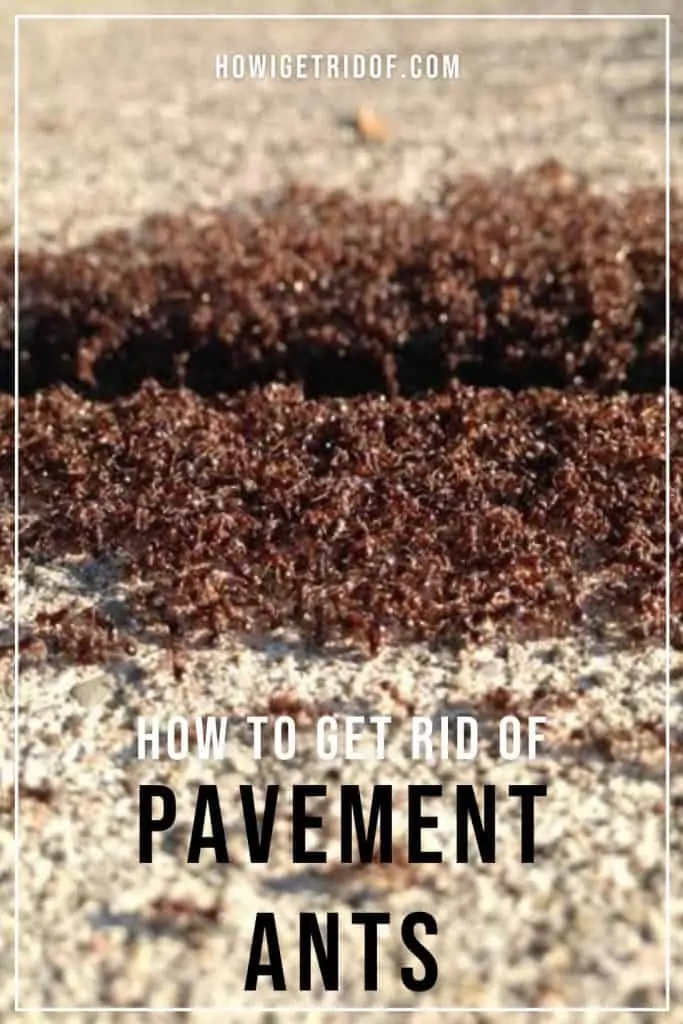

Jack founded our blog after two decades of working in the pest control industry. His vast experience dealing with a wide array of pests allows him to diagnose issues quickly and get to the heart of pest problems quickly and effectively. He has serviced more than 2,000 homes over his career and there is hardly any pest situation that he has not seen before.
